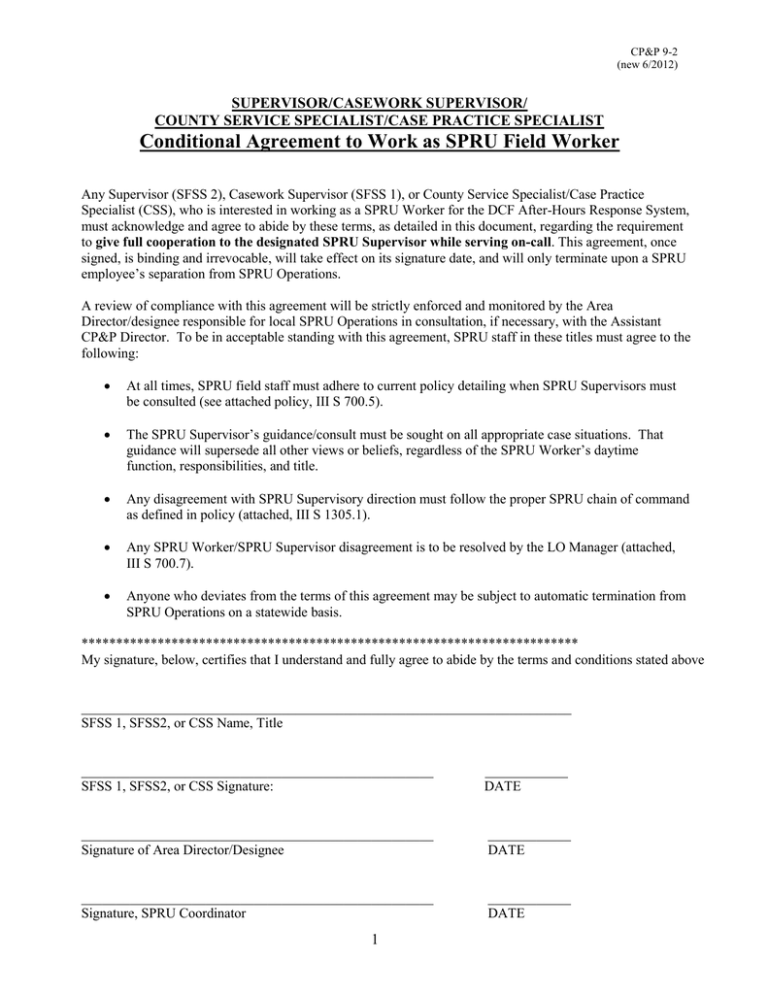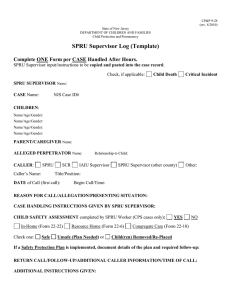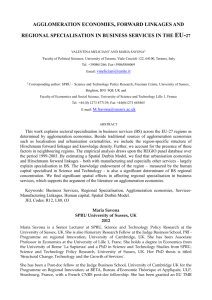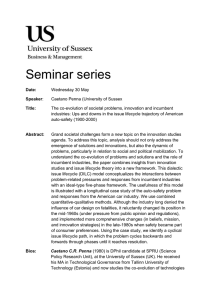Conditional Agreement to Work as SPRU Field Worker SUPERVISOR/CASEWORK SUPERVISOR/
advertisement

CP&P 9-2 (new 6/2012) SUPERVISOR/CASEWORK SUPERVISOR/ COUNTY SERVICE SPECIALIST/CASE PRACTICE SPECIALIST Conditional Agreement to Work as SPRU Field Worker Any Supervisor (SFSS 2), Casework Supervisor (SFSS 1), or County Service Specialist/Case Practice Specialist (CSS), who is interested in working as a SPRU Worker for the DCF After-Hours Response System, must acknowledge and agree to abide by these terms, as detailed in this document, regarding the requirement to give full cooperation to the designated SPRU Supervisor while serving on-call. This agreement, once signed, is binding and irrevocable, will take effect on its signature date, and will only terminate upon a SPRU employee’s separation from SPRU Operations. A review of compliance with this agreement will be strictly enforced and monitored by the Area Director/designee responsible for local SPRU Operations in consultation, if necessary, with the Assistant CP&P Director. To be in acceptable standing with this agreement, SPRU staff in these titles must agree to the following: At all times, SPRU field staff must adhere to current policy detailing when SPRU Supervisors must be consulted (see attached policy, III S 700.5). The SPRU Supervisor’s guidance/consult must be sought on all appropriate case situations. That guidance will supersede all other views or beliefs, regardless of the SPRU Worker’s daytime function, responsibilities, and title. Any disagreement with SPRU Supervisory direction must follow the proper SPRU chain of command as defined in policy (attached, III S 1305.1). Any SPRU Worker/SPRU Supervisor disagreement is to be resolved by the LO Manager (attached, III S 700.7). Anyone who deviates from the terms of this agreement may be subject to automatic termination from SPRU Operations on a statewide basis. ************************************************************************ My signature, below, certifies that I understand and fully agree to abide by the terms and conditions stated above _______________________________________________________________________ SFSS 1, SFSS2, or CSS Name, Title ___________________________________________________ SFSS 1, SFSS2, or CSS Signature: ____________ DATE ___________________________________________________ Signature of Area Director/Designee ____________ DATE ___________________________________________________ Signature, SPRU Coordinator ____________ DATE 1 CP&P 9-2 (new 6/2012) III S 700.7 LO Manager Resolves SPRU Worker - SPRU Supervisor Conflict Any crucial case practice or case handling disagreement between a SPRU Worker and a SPRU Supervisor occurring after hours, which cannot be readily resolved, is referred by the SPRU Supervisor to the Area Director/Local Office Manager Responsible for SPRU, or his or her designee for resolution. The Area Director/Local Office Manager Responsible for SPRU/designee contacts the SPRU Worker for additional information, if necessary, before making an administrative decision. If a SPRU Worker disagrees with advice given by a SPRU Supervisor, he or she may call the Area Director/Local Office Manager Responsible for SPRU, or his or her designee him or herself, after first advising the SPRU Supervisor of his or her intent to take such action. III S 700.5 When a SPRU Worker is Required to Contact the SPRU Supervisor A SPRU Worker may request advice from, the assistance of, consultation with, or to get direction from the SPRU Supervisor whenever he or she feels it is necessary. The SPRU Worker must call the SPRU Supervisor, however, in the following situations: • To report a child death or a near fatality, SPRU Worker injury (work related), a Safe Haven infant (see II M 600), or other critical incident. See II A 2700, Critical Incident Reporting, and II A 3000, Child Death and Near Fatality Reporting. • To remove and place a child into substitute care. When possible, the SPRU Supervisor is contacted before the child is removed; otherwise the Supervisor is contacted as soon as possible after the emergency removal. The SPRU Supervisor assures that the SPRU Worker contacts SCR for an NJ SPIRIT check regarding the resource family home care provider before the child is placed or re-placed, to confirm that the home is licensed, and in "approved" status. See II C 1300, Removal of a Child, II C 1300.6, Consult Supervisor in Removal Decision. • When SPRU seeks to remove a child, and place him or her with a relative or family friend, the SPRU Supervisor coordinates required CARI, Children-in-Court (CIC), and CHRI checks through SCR, and contacts the LO Manager or designee for approval to place the child with the relative or family friend (presumptive eligibility). See II D 1801, Placing Children with Kinship Caregivers, 1801.3, Pre-Placement Protocol. • To conference a case, to assess child safety and develop a viable Safety Protection Plan. See II A 2001, Child Safety 2 CP&P 9-2 (new 6/2012) Assessment (In-Home), and II A 1903, Assessing Safety After Hours. • When assigned a report in which a police officer, probation officer, or physician acting under Title 9 has removed a child from his or her parent's custody without the parent's consent (i.e., performed a Dodd removal). See II C 1300. • To represent CP&P in a Hospital Hold situation. See II C 1100, Protective Custody or "Hospital Hold." • To handle consents to non-routine medical treatment for children in CP&P-paid out-of-home placement. See III S 303.3. • To initiate services which require payment (unless prior approval was granted by LO administrative staff). • To report a third field assignment from SCR during an eighthour shift, to determine whether the SPRU Worker can adequately handle the third such assignment and not leave a child in danger or at undue risk; and to assure that the SPRU Worker will have sufficient time to write up a quality response report before the start of the next work day. See III S 500.5, Contact SPRU Supervisor Before Responding to Third Field Assignment (Required). • To report that he or she has not had any sleep for 23 consecutive hours, and may thus present a risk of harm to him or herself or to a child, if operating a motor vehicle (see III S 902.4, Compliance with Maggie's Law). • To resolve conflict with SCR over a case assignment, response time, or case coding. • To resolve matters of personal conflict of interest regarding a specific case assignment. See II B 1507. • To request approval not to respond to a situation and/or to postpone a field response which would usually require field intervention. See Decency of Hour Policy, III S 900.8. • To request another SPRU Worker's assistance or accompaniment (i.e., "Buddy") in the field, unless prior approval was granted/local protocol has been established. See III S 400.7, Use of Second SPRU Worker ("Buddy") on Field Response. 3 CP&P 9-2 (new 6/2012) • To advise that he or she will not be able to transport a child to school the first school day after placement. The SPRU Supervisor will need to contact the Local Office Manager responsible for the case, to authorize reassigning the case to SPRU or activating day staff to work overtime. See III S 900.9, Educational Stability - SPRU Transporting Child to School First School Day After Placed. • To advise that SPRU intervention may result in noncompliance with CP&P policy and procedures. • To re-assign a SPRU case. See III S 900.4, SPRU Worker Responsibility for Completing Case Assignment. • To leave the county on an assignment, which may result in a gap in coverage if an additional intake is taken by SCR. • To take a State car out of the State of New Jersey. • To resolve a SPRU coverage problem. • To resolve conflict with a representative from another agency (e.g., hospital staff, the police, the County Prosecutor) or CP&P staff (the assigned Worker/Supervisor, a SPRU Worker from another county, etc.). • To invoke the Interstate Compact on Runaways. See Interstate Services Manual, II J. Contact SCR if access to the Manual/Compact is needed. • To report special/serious client or community complaints or dissatisfaction with CP&P services/actions which need immediate administrative attention. • To report that the matter at hand may have the potential for media/press attention. See II A 2700, Critical Incident Reporting. • To report a breakdown, break-in, or motor vehicle accident involving a State car, or a break-in or other damage to a Local Office or other State property occurring, or discovered after business hours. 4 CP&P 9-2 (new 6/2012) Local operations or the Area Office may require that SPRU Workers contact SPRU Supervisors in additional situations/under other conditions as well. Consult the SPRU Coordinator for locally imposed protocols and procedures for SPRU Worker-SPRU Supervisor consultation. III S 1305.1 Chain of Command (Local SPRU Operations) The CP&P chain of command for SPRU operations after hours is as follows: • SPRU Worker reports to his or her respective SPRU Supervisor. • SPRU Supervisor reports to the Local Office Manager responsible for the county/catchment area or the open/active case. • LO Manager reports to the Area Director. • Area Director reports to the Director. SPRU Coordinators are part of work day administrative operations and are outside the after-hours chain of command. 5

![Prof Jim Skea abstract and bio [DOCX 11.61KB]](http://s2.studylib.net/store/data/015015010_1-36608292abe33ff183c3888f45090b3d-300x300.png)
![Science Ajar: PowerPoint presentation [PPTX 17.33MB]](http://s2.studylib.net/store/data/015014990_1-0bc759a31ae2aea6ef5c7dc9b92481c2-300x300.png)

